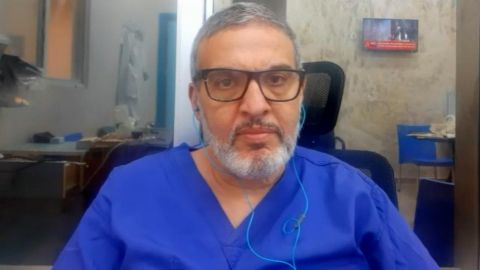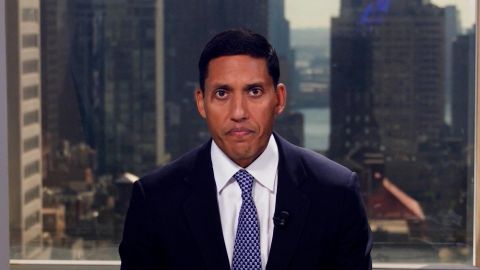Read Transcript EXPAND
MARK REGEV, SENIOR ADVISER TO THE ISRAELI PRIME MINISTER: So, on the hostages, I’d like to say two things, with your permission, Christiane. Number one, it has to be understood, that we are watching, and we are watching closely. And if any harm comes to these hostages, we will find those responsible and we will bring them to justice and they will pay. And if it takes a year or five years, or 25 years, if they are involved in harming those hostages, Israel will find them and there will be retribution. And that should be perfectly clear. A second thing that has to be said is that what they’ve done in kidnapping all these people, over a hundred, is against all international law. It is unacceptable behavior. And the message from the International Community has to be clear, crystal clear, unequivocal. There should be the immediate and unconditional release of all these hostages, period.
AMANPOUR: Are you not concerned, you say you have eyes on and you’re watching very closely, that your very heavy bombing campaign inside Gaza may — how do you know that you’re not inadvertently putting the hostages in danger? Do you know where they are?
REGEV: I’m not going to go to what we know and what we don’t know, but it is crucial that Israel hit back hard against Hamas. Christiane, you and me have both been on different ends. You’ve been a journalist and I’ve been in government. But we’ve been through, what is it, five, six escalations in Gaza, the different rounds of fighting. This is not another escalation. This is not another round of Israel Hamas fighting in Gaza. This is war. What they did on Saturday morning when they attacked across a long front in scope and in scale and in sheer brutality of their behavior, which both the prime minister today and the visiting secretary of state described as ISIS-like, that was an escalation of massive proportions. They have declared war on my country. We didn’t want this war. But we are responding in force, and we will finish this war. We didn’t start it, but we will finish this war on our terms.
AMANPOUR: Mark Regev, I need to ask you a question that many Israelis are asking, and we see it on social media, we see it on television. There is a great deal of anger, despite this slaughter that civilians have gone through and that the country is in shock about, there is a huge amount of anger directed at what they believe was eyes off the ball, incompetence in government. And I’m just going to read you a couple of polls from the Dialogue Institute. 84 percent of the public believes that the infiltration of Hamas terrorists into the southern settlements were due to negligence of your country’s leadership. 94 percent believe that the government is responsible for the situation that led to the collapse of the entire system of protecting the settlements in the south. And 56 percent believe Netanyahu should resign when this fighting is over. And today, we saw images on television of a minister being literally heckled and being told by people in a hospital that it’s your fault, you’ve ruined the country, you’re responsible. So, my question to you frankly is, how should your people have confidence that this government, which claims to have been taken by surprise, can actually redeem its people and get the hostages back and do what you say you want to do in Gaza?
REGEV: People have every right to be angry. I mean, Israelis, as you know, have for years prided themselves on the excellence of our interne — intelligence services. And yet, it’s clear this time we were surprised. Something went very, very wrong. There were also complaints about the IDF’s speed of response.
AMANPOUR: That’s right.
REGEV: Were they very quick enough to deal with the attackers once they crossed the border? And of course, as you’ve said, there were complaints about the political leadership. Now, on these issues, I want to say two things. Number one, as the polling also said, Israelis want to win this war, and we will. And we’re now uniting to win this war, and though Israel has suffered from a very divisive and polarized politics over the last few months, you see us coming together because of the crisis. And as you saw last night, the formation of this national unity government with parties that used to be in the opposition so as to show a united front, and this is an expression of what the Israeli public wants. And once this is over, once we have won, you know Israeli history, we’ve had inquiries after wars, we know how to investigate ourselves. We will look into what went wrong, what was right. Lessons will be learnt.
About This Episode EXPAND
Benjamin Netanyahu’s senior adviser Mark Regev discusses the Israel-Hamas War. British-Palestinian surgeon Ghassan Abu Sittah left London for Gaza on Sunday and joins the show. Israeli author and historian Yuval Noah Harari discusses the origins of the conflict in this region. Dr. Rajiv Shah, author of the new book “Big Bets,” on how decision makers can learn from conflict and implement change.
LEARN MORE


